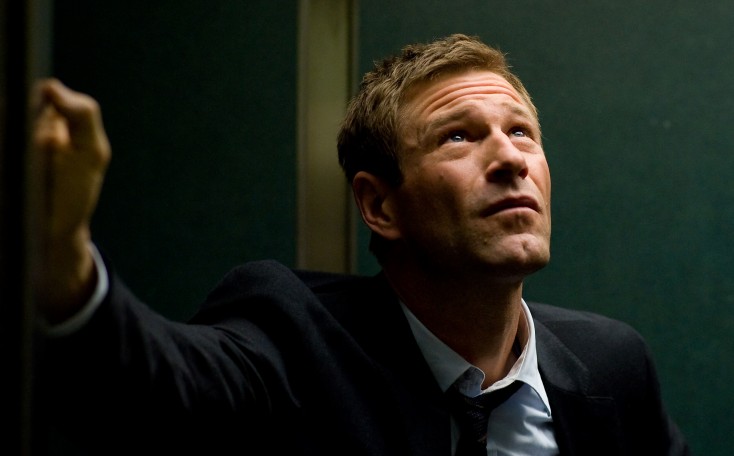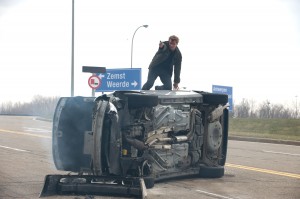By ANGELA DAWSON
Front Row Features
HOLLYWOOD—Having just completed a six-week world press tour to promote the White House actioner “Olympus Has Fallen,” Aaron Eckhart is a bit jet-lagged.
“I had no idea what month it was or what country I was in or what day it was,” he says of his globe trekking adventure.
With barely time to get readjusted to being home, the handsome leading man is back on the road promoting another movie. This one is called “Erased.” It’s a spy thriller in which he is the star. It’s gritty, violent and action-packed, and he gets to be the hero as opposed to his previous role where he played a tied-up, kidnapped president waiting to be rescued by Gerard Butler’s character. It’s the kind of role that Eckhart relishes. He co-stars with former Bond girl Olga Kurylenko, who plays a duplicitous CIA agent and newcomer Liana Liberato, who plays his estranged teenage daughter, who doesn’t know he’s a spy.
Directed by German filmmaker Philipp Stolzl, “Erased” was shot in Brussels and Montreal and has a very European look and tone. Eckhart, who lived in France for a few years while growing up, got a chance to practice his language skills in French-speaking Belgium. The 45-year-old bachelor also got to play a father—a role he’d like to eventually play in real life.
Q: It’s interesting the juxtaposition of “Olympus Has Fallen.” In “Olympus,” you’re the guy they’re trying to save and protect, and in “Erased,” you’re proactive and out there kicking butt.
Eckhart: Thank God! I’ll tell you what, “Olympus” was a lot of fun to play, but to sit on your butt tied to a railing for an entire movie while somebody else is saving you (is dull as an actor) so it’s good to get out in “Erased.”
Q: What did you think of your lovely co-star, Liana Liberator, who was 15 when you shot this (and is now 17)?
Eckhart: I just saw her for the first time on this trip since we did the film. She’s grown up so much into a young lady. That was really the reason why I wanted to do the movie was that father-daughter relationship because I don’t have kids. In close quarters in a strange country, having to deal with the problems of a teenage girl liking boys, trying to get her to school, the grades, and then to have to go out and do what we do, I thought that was a fun premise.
Q: Can you talk about how you trained for the action sequences?
Eckhart: I trained real hard. I did jujitsu and MMA (mixed martial arts). I had a French Special Forces crazy man named Olivier train me who inflicted great pain on me and really taught me everything I know about jujitsu and all the fighting. It’s very important that I do all the fighting in the movie, and that it be real, and that I know what I’m doing because this is a smaller movie. When I got there, we had to get into it real quick. We didn’t have the time to choreograph these fights like you usually do with a huge film. So I had to know the language coming in, the submissions, and the handholds—all of that sort of stuff. It was fun but very dangerous. I peeled my thumb all the way back and ripped all the ligaments in my hand two days before we started filming. I just heard it rip, and I had to do the whole thing with my thumb (injured).
Q: You have a great chemistry with Olga Kurylenko. How did you two work together?
Eckhart: She came in late to the movie, so there wasn’t a lot of time (to rehearse). I tried to make that character as sexy as I could. My impression was this girl and I were in Beirut together under very difficult situations in a shack with a candle and a can of tuna for three months. That’s how I saw us. We fell in love and basically had a mad love affair under insane conditions. That’s what I wanted in this movie. I thought that was pure Hollywood romance, but it wasn’t written in the script. And so, how do you take Olga’s character with this pretty cut and dry dialogue and try and make it sexy? I wanted it to be sexy. So, we tried that. We didn’t have a lot to work with in this case. They didn’t develop it that much. But I like Olga a lot. She came in and is a total pro. She’s very beautiful and a very good actor, and so it was very natural.
Q: How did you find it shooting on location in Montreal and in Brussels?
Eckhart: I loved it. Montreal was tough because it was winter going into spring. It’s very cold, but very beautiful. I tried to speak French the entire time because I lived in France for two years, so my French is a little bit sketchy. I tried to speak French the entire time, plus I speak French in this movie, so I wanted it to be passable. The main worry was the crews. How do you split a movie up and then work with European crews in an American action movie with a German director? Everybody was all over the place, but it was absolutely seamless. When you’re working in those big, huge train stations and out on the street and having all the different languages and the cafes, it just works for the movie. On that train, we had three hours to shoot the (scenes). That means to get on, not three hours to act. It’s three hours to get our stuff on, to set up, and shoot it. It was interesting working in that way, but it only enhanced it.
Q: When you were in Brussels, did you notice the diversity of the population there as depicted in film?
Eckhart: Oh yes. In fact, there’s a huge Arab population there, and I was living right in the middle of it when we were there. I don’t know where they’re from, if they were Tunisian or Algerian. I don’t know the specifics, but North African. And then, there were a lot of Southern Africans there as well. So they had all that population, all those restaurants, all those shops and that flavor. We filmed in it, which was really nice. And then, you had the traditional Belgium. And then, you had all the tourists on top of it, and they were in the movie, too. So it had a lot going on there. And then, the fact that I was American and everybody was speaking French. That kind of stuff keeps you on your toes.
Q: What do you remember most fondly about Belgium?
Eckhart: I had an Italian driver living in Brussels. He wouldn’t let me drink espresso unless he made it, because he thought that (the Belgians) were inferior espresso makers, and that since he was Italian and only Italians know how to make espresso, he would go to great lengths to give me my espressos whenever I needed them. I very much appreciated that … and I couldn’t tell the difference.
Q: Has that now ruined you for life?
Eckhart: No. I like diner coffee. (He laughs.) I’m a man of the people.
Q: Did he let you smoke a cigar inside the car?
Eckhart: No. I never would, but I do smoke cigars constantly, unfortunately.
Q: Since you’re not really a father, what did you tap into in order to get that emotion and develop that connection?
Eckhart: I thought I would have children by now. I did. It’s not planned that I don’t have children. Family has always been very important to me—the role of a father, my dad to me, how I would teach my children, developing their minds, and their formative years. And, these are Liana’s formative years when we made this movie. I’m always fascinated with how a person becomes a good quality person, a productive person, and how it happened to me, because I was a terror.
Q: A good terror?
Eckhart: No, not always. I come from very good parents, very smart, dedicated parents, who just had their 50th wedding anniversary, and they’re good people. I think it’s the rudder there, that rudder in those turbulent waters, because they picked up and took us to England when I was 13. I lived Liana’s character in this movie. I used to hate my parents for that. I hated them vehemently, and I told them. It was very difficult to do. And then I came to love them for doing it. I’ve always been fascinated with that, and how you deal with issues today if you’re a parent: this whole drug issue, rebellion, cell phones, texting, the music and the fashions.
Q: Has your desire for parenthood changed as you’ve gotten older? Is it stronger? Is it different?
Eckhart: I was talking to somebody about this last night—a girl who would also like to have children. You know when people say to you, “I just always have known I want to have kids,” well I’ve never thought about it. I still feel like I’m dealing with issues with my job and myself. I’m so ambitious in my job. There’s nothing in me that’s pushing me to have kids, I have to say. I think it’s weird. It’s not how I thought I was going to live my life, but I would love to have kids, because now I have a ranch in Montana. The last time I was at my ranch, I was with my mom, and we were walking around. It was sunset and all that sort of stuff. I turned to her and I said, “I have to have kids now.” So that’s the closest I’ve come. I just have to find the right person.
Q: What do you have coming up next?
Eckhart: I have a movie coming out called “I, Frankenstein.” I play the monster Frankenstein. It’s a different look at him. It’s a movie about good and evil, and I am proficient at the Filipino martial art of Kali stick fighting. (He laughs.) I know, I know. (“Frankenstein” author) Mary Shelley was ahead of her time. I’m also producing some movies.






